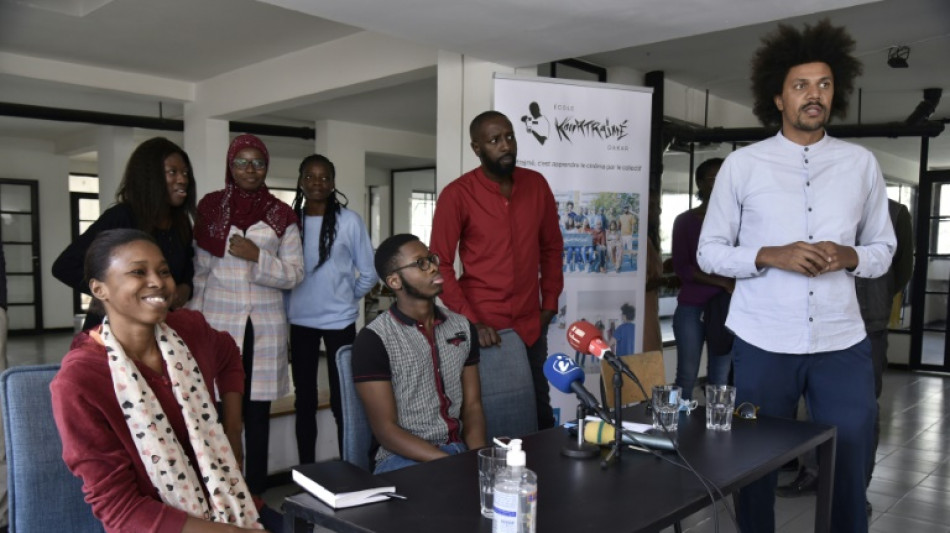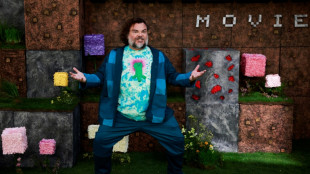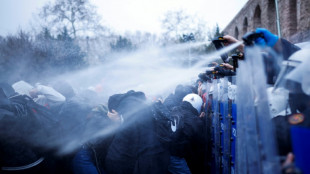

Ground-breaking film school gets down to work in Senegal
It's the tale of a boy who cheats on his fiancee -- one misdeed too many in a selfish life -- and in desperation turns to a genie for help.
The genie gives the errant lad five magic cowrie shells to wipe the slate clean... but these will only work if he uses them wisely.
This is the idea for a script pitched by Kine Niang, a 30-year-old student screenwriter at new film school in Senegal that hopes to unlock Africa's movie-making potential.
Housed in a beautiful old office building converted into a cultural space in the capital Dakar, the school is the first venture in Africa by a ground-breaking collective which offers free training in filmmaking.
The scheme is being pushed by Ladj Ly, a French director and screenwriter who won the jury prize at Cannes in 2019 for "Les Miserables" -- a film about urban violence, set in the gritty Paris suburb of Montfermeil where he grew up.
His collective, Kourtrajme, has already helped set up two other such schools, one in Montfermeil and the other in Marseille.
They offer training in cinema and other audiovisual professions, free of charge and without conditions of age or academic qualifications.
Ly and Toumani Sangare, a director who co-founded Kourtrajme in 1995 and is the school's co-head, both have roots in Mali and were keen to found their latest venture there. But serious unrest thwarted the plan.
Even in more peaceful Senegal, Ly and his partners would have appreciated a few magic cowries to make the task easier, with red tape and the Covid pandemic hampering progress.
Fame "opens a lot of doors", said Ly, "but it is still an obstacle course, to tell yourself that you want to create free schools, open to all."
- Tough challenges -
The goal seems utopian on a continent where many countries may dream of a film industry but lack the resources to even start.
The sector is dominated in Africa by Nollywood, giant Nigeria's production hub, which churns out about 2,500 films a year.
The UN cultural organisation UNESCO reported in October last year that only 44 percent of African nations even have an established film commission.
And, it said, other challenges for filmmakers are many, from piracy to constraints on freedom of expression.
In February 2021, Ly was caught up in an investigation targeting the association which oversees the school, for alleged breach of trust and money laundering.
The director and his brother were questioned by police. The probe is now over and the public prosecutor's office has said it is examining what action to take if necessary.
Ly spoke of "sabotage" attempts and damaging "nonsense" written by a former employee.
"Our school disturbs a lot of people, they did everything to wreck it," he said.
"But the important thing is that the school exists and we continue to open them everywhere" — Madrid is the intended location for the fourth establishment.
- Senegal skills -
"Senegal has become a go-to country in audiovisual production, in particular for series," Sangare said.
Many international productions are filmed here, the technicians are well-trained and the landscapes "incredible", he said, all of it "five hours from Paris" by air.
Fourteen young people -- seven women and seven men, chosen from among hundreds of applicants -- are to be trained in screenwriting for five months.
The school will take in 18 apprentice directors in June.
The first year's budget of 400,000 euros ($453,000) is being funded by France's AFD development agency and private partners, including the French television and film channel Canal+.
Niang, a novice screenwriter, was first selected a year ago. After months passed, she was about to begin a management internship when she got the call that the school was finally getting off the ground.
She has qualifications in statistics but said she is "mad keen about writing... it was a chance that I couldn't pass over."
Their class started work on Tuesday.
"We started the course with the question: why do you write?" said their trainer, Dialika Sane, who has worked on a number of television series.
The responses were "very inspiring, sometimes absurd, sometimes poetic," Sane said.
But everyone "understood the job of screenwriter, the very essence of the job -- to project on screen what cannot necessarily be said by other means."
N.Tornincasa--IM



